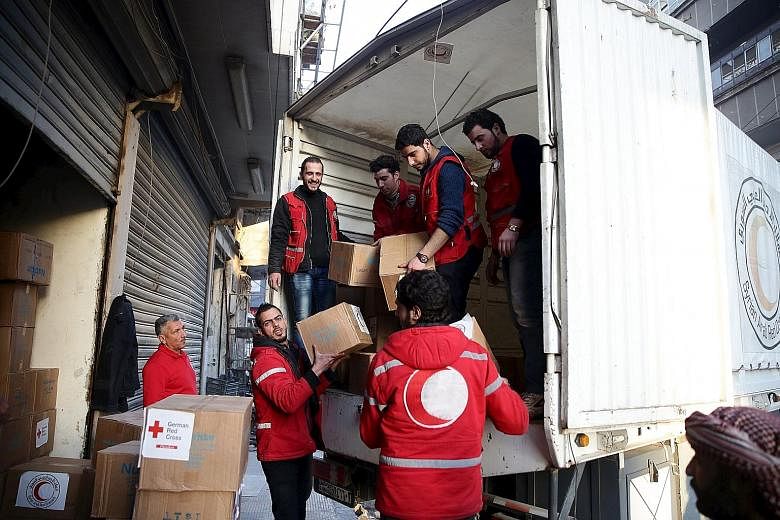ALEPPO (Syria) • In the Syrian city of Aleppo, rescue workers have been taking advantage of the quiet to play football. For the first time in years, they have no one to save.
Their ambulance parked nearby, the volunteers known as White Helmets have been relishing the calm of a landmark truce across parts of the country that was in its third day yesterday, as much-needed aid started to come in.
The truce is meant to open the way for the aid to be sent to the more than 480,000 Syrians living in areas besieged by government forces, rebels or militants.
Doctors and emergency workers in Syria, who typically worked round the clock in fraught conditions since the conflict erupted in 2011, have been treating wounded victims practically non-stop.
So when a ceasefire came into effect across large parts of Syria early last Saturday, many breathed a sigh of relief. "There were days where we would get 50 calls in each of our 114 emergency call centres across Syria," said Mr Abdelrahman, a spokesman for the White Helmets.
But after the cessation of hostilities began, he said, the number of pleas for help plummeted: "We got 10 calls the whole day from all of the centres put together."
Volunteers think they may even be able to take an extra day off this week, although many also fear "the calm before the storm".
On Twitter, the White Helmets posted a picture of a shut door with a sticker on it: "Closed because of the truce."
"We hope that our centres will be closed every day - but we are still ready," said Mr Abdelrahman.
Dr Hamza al-Khateeb, who runs a hospital in an opposition-held eastern neighbourhood, said he is happy finally to be seeing fewer war wounds. "A relative calm has prevailed and we haven't received any people wounded from gunfire or shrapnel from shelling over the past two days," he said.
"But the number of patients with other ailments who are coming to our clinics has risen."
Patients with diabetes and similar illnesses, who were too afraid to make the journey to the hospital under bombardment, were now finally getting treatment, he said.
In Damascus, one local doctor said the relative peace means that he and his team have even begun to think of taking a long-needed holiday. "We're still at the ready in case there are any ceasefire violations," he said, on condition of anonymity.
Over the weekend, emergency workers were back to covering "normal" injuries that they "had almost forgotten existed" - car accidents, scrapes and bruises. "Maybe there'll even be an opportunity for time off outside the halls of this clinic," the doctor said hopefully.
United Nations humanitarian coordinator Yacoub El Hillo said the world body hoped to take advantage of the relative calm to distribute supplies to 154,000 living in besieged areas over the next five days.
Aid workers yesterday began carrying out the first delivery of humanitarian assistance to Syrians since the truce came into effect, the Syrian Arab Red Crescent said.
It added that 10 trucks of aid, including blankets and hygiene supplies provided by the UN, had entered the besieged rebel-held town of Moadamiyet al-Sham south-west of Damascus.
Red Crescent official Muhannad al-Asadi said it was "the first delivery since the beginning of the truce" and that another 41 trucks were set to enter the town yesterday.
The trucks were carrying sanitary pads, soap, laundry detergent and blankets provided by the UN's refugee and child agencies, he said. It was the third delivery last month to the town, which is surrounded by pro-government forces and had seen an uptick in violence in recent months.
AGENCE FRANCE-PRESSE

